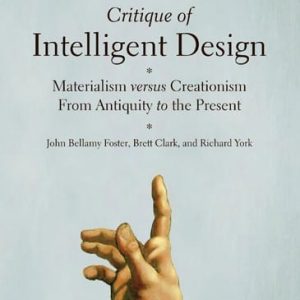Materialism vs creationism
Issue: 134, Posted: 27 March 12
by Amy Gilligan
John Bellamy Foster, Brett W Clark and Richard York, Critique of Intelligent Design (Monthly Review Press, 2008), £10.95
Intelligent design—the notion that the complexity we see in the universe could only have arisen due to the intervention of a “designer” or creator—has seen somewhat of a resurgence in the 21st century. Particularly in the US, right wing fundamentalist Christians have attempted to force schools to teach intelligent design alongside evolutionary theory in an attempt to provide credibility for their ideas as “science”. For those who wish to promote intelligent design, attacks on Darwinism and evolutionary theory are seen as the thin end of a wedge which opens up space for theological arguments and a wider attack on materialism.
The authors trace the history of debates between materialists and those who invoke a creator to explain the world around us from antiquity to the present day. Socrates was the first to develop an argument for intelligent design and his ideas were shared by many others in ancient Greece. Epicurus presented the first fully worked out materialist position, countering creationist ideas at the time, as well as developing the beginnings of a proto-evolutionary theory. The authors further trace the revival of materialism in the enlightenment to discussions of Marx, Darwin and, somewhat unnecessarily I feel, Freud.
Overall, the authors provide an engaging discussion of the history of debates surrounding creationism and materialism. The penultimate chapter, which discusses the conclusions reached by evolutionary biologist Stephen Jay Gould, is particularly clear. It manages to discuss concepts such as punctuated equilibrium and contingency in a very accessible way. Gould’s ideas are important to challenge the arguments presented by Richard Dawkins and others who would seek to reduce evolutionary history entirely to the level of genes, rather than seeing that selection can operate on every level of biological complexity in an interdependent way. The book would perhaps have benefited from a more explicit discussion of this debate.
The authors place the arguments used to promote intelligent design within the context of a broader attack on materialism. This is a useful approach as it forces the debate into a more philosophical terrain. This means there can be greater discussion of ways in which humans have interpreted the world around us and the reasons for these interpretations, rather than finding it necessary to defend evolutionary theory from attacks posing as science….
Read the entire review in International Socialism

Comments are closed.